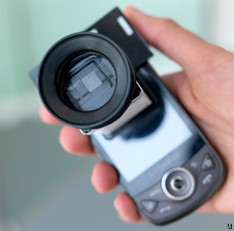Indian born with team at MIT develop tool for eye tests on mobiles
 Associate Professor Ramesh Raskar and postdoctoral research associate Ankit Mohan at the media lab of the prestigious Massachusetts Institute of Technology (MIT) with a group of researchers have developed a device named NETRA (Near-Eye Tool for Refractive Assessment) that can be used by people to conduct eye tests through mobile phones.
Associate Professor Ramesh Raskar and postdoctoral research associate Ankit Mohan at the media lab of the prestigious Massachusetts Institute of Technology (MIT) with a group of researchers have developed a device named NETRA (Near-Eye Tool for Refractive Assessment) that can be used by people to conduct eye tests through mobile phones.
NETRA relies on software and a snap-on plastic device that is expected to cost about $ 2 and much lesser if produced in large quantities. In the test, the plastic device is placed on cell phone's screen and the user needs to see in the lens of NETRA. The user will be able to see two lines, one red and the other green in color.
The user then will need to adjust and bring both the lines aligned. People without any eye problem will see lines merge. The process is repeated eight times from different sides. The software then gives the information about the test. The process consumes less than two minutes and software then shows the test data.
NETRA which means eye in Sanskrit has shown successful results and will soon be tested in collaboration with a hospital in Hyderabad. It however now works only with high resolution phones however the team is working to make it available on a range of phones and also on phones with lower resolution.
The tool can make eye-testing affordable, accessible and simpler for millions of people around the world. The researchers took notice of the high resolution mobile screens available through out the world and developed that tool that could be spread as an app on the phones.
The team of researchers will make the tool commercially available under the name "PerfectSight" and launch it first in Asia and Africa. The tool could make eye-testing affordable, accessible and simpler for millions of people around the world.
"You can think of it as a thermometer for visual performance. Just as a thermometer measures corporal temperature and does not prescribe medicine, NETRA measures the refractive error and does not necessarily prescribe glasses," says Raskar.